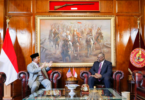NEW DELHI (Monitoring Desk): Former foreign minister Khurshid Mahmud Kasuri told India here on Friday to not confuse an ongoing anti-Delhi uprising in the Kashmir Valley with any activities of the militant Islamic State group.
“It may be dangerous to paint the current uprising of the Kashmiri people as inspired by ‘Islamist terrorism’,” Mr Kasuri said during a discussion on India-Pakistan ties, his second in two days in Delhi.
Mr Kasuri said that statements of certain extremist elements were prominently displayed and IS flags were also shown as being waved during demonstrations in Kashmir. “It is clear from the reports in the Indian media, that, overwhelmingly it is the Pakistani flags that are waved, and, there are very few Daesh [the Arabic acronym for IS] flags in such public demonstrations.
“If Kashmir issue is not dealt with politically, matters may actually get out of hand. Let us hope that the day never arises when Pakistani flags are replaced by Daesh flags. If, unfortunately, it does happen, it will have been a case of a self-fulfilling prophecy,” he said.
Mr Kasuri was joined at the discussion, sponsored by the Ananta Aspen Centre, by former Congress MP Mani Shankar Aiyer who chaired the meeting.
His presence was significant since the discussion was taking place a day after Mr Aiyer was expelled from the Congress party for allegedly calling Prime Minister Narendra Modi a vile man.
Former Indian high commissioner to Pakistan Satinder Lambah also took part in the discussion. Mr Kasuri said that despite strained ties between the two countries, he was pleased to see a large support for the resumption of talks between India and Pakistan.
“The current situation is so bad and the atmosphere so vitiated in South Asia that it has effectively put an end to regional cooperation, where even a meeting of the heads of Saarc [South Asian Association for Regional Cooperation] countries could not be held,” Mr Kasuri regretted.
He said it was futile and counterproductive for India to believe that it could isolate Pakistan or mount pressure through a third country to surrender its interests. “Since neither side can win a war, peace is the only way forward. For that an early resumption of dialogue should be our top priority.”






